Dorycnium hirsutum
Ice Alpine
This subshrub produces clusters of white flowers veined with pink from summer into fall. It is extremely drought tolerant. Cut plants back before new spring growth to renew. Often used as a "spiller" plant, draping over rocks, ledges or along the edges of paths. Canopy coverage: 7 square feet.
[Read More]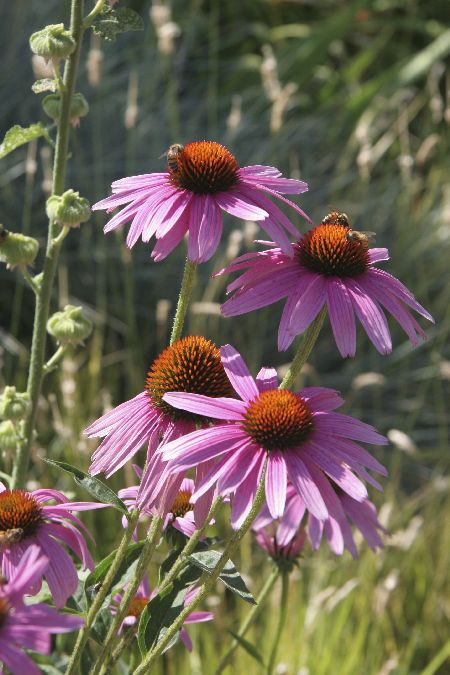
Echinacea purpurea
Purple Coneflower
The flowers of Purple Coneflower are daisylike and reach up to 4 inches across. They are definite eye-catchers, particularly when they bloom on top of stems 3 feet or more high. Consider it a rough-textured, but easy-to-grow perennial. Canopy coverage: 3 square feet.
[Read More]Epilobium canum garrettii
Hummingbird Trumpet
Hummingbird Trumpet is a colorful, low-growing subshrub (small shrub) that can also serve as a groundcover. Ideal for a naturalistic garden. Strong blooming period comes on late in the season when color is not as common so it is more appreciated. It may be sold as Zauschneria. 'Orange Carpet' is an improved selection. Canopy coverage: 13 square feet.
[Read More]Epilobium latifolia johnstonii
Bush California Fuchsia
Bush California Fuchsia is one of those plants who's name (genus and species) has been in a constant state of change. May be sold as Zauschneria. Extremely profuse flowering produces a red-orange carpet of color. Strong blooming period comes on late in the season when color is not as common. Canopy coverage: 13 square feet.
[Read More]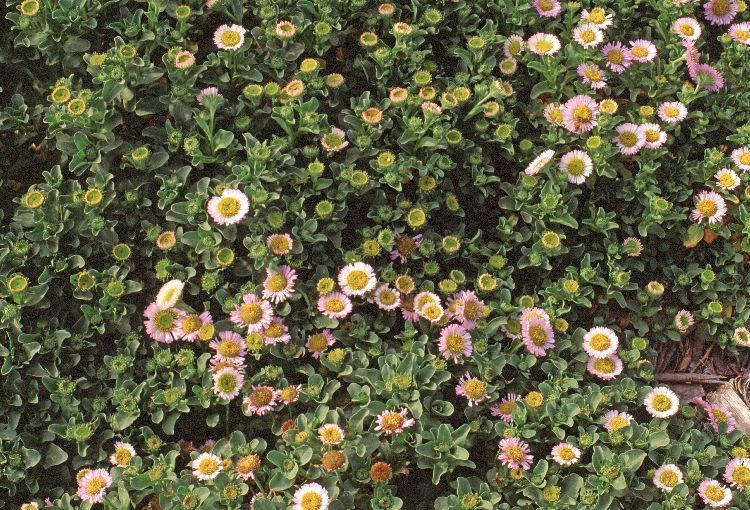
Erigeron glaucus
Fleabane
Typical of many plants in this database, Fleabane thrives in full sun along the coast, but does best with some afternoon shade. Presents a neat, somewhat formal appearance. 'Wayne Roderick', shown in photos, is more heat tolerant—even desert heat—compared to other Fleabanes. Canopy coverage: 3 square feet.
[Read More]Erigeron karvinskianus
Mexican Daisy, Santa Barbara Daisy
This little perennial accepts full sun exposure along the coast; provide with afternoon shade and additional water in hot inland areas. Tiny, daisylike flowers about 3/4 inch wide and have yellow centers. They are white then age to pink and magenta. They can be invasive so be ready to control planting beds. Canopy coverage: 7 square feet.
[Read More]Eriogonum jamesii
Creamy Sulphur Flower
Creamy Sulphur Flower form low-growing, mounding mats. Useful for erosion control, plants drape and cascade down rocky slopes. Canopy coverage: 1 square foot.
[Read More]Eschscholzia californica
California Poppy
This wildflower is very popular—likely the most popular wildflower, period. California Poppy is a shortlived perennial most often grown as an annual. It is known to naturalize in many regions of California and the Southwest. Plant seeds where you want plants to grow in the fall.
[Read More]Euphorbia polychroma
Cushion Spurge
Cushion Spurge is so-named due to its rounded, mounding growth that reminds one of a chair cushion. Its eye-catching, sulphur yellow color comes from the bracts, modified leaves, that surround the insignificant greenish flowers. Accepts some shade but better appearance in full sun. Sap may irritate skin. Canopy coverage: 3 square feet.
[Read More]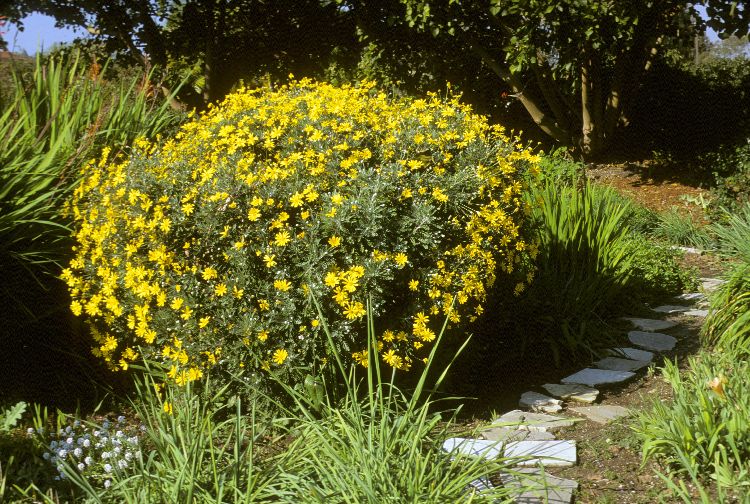
Euryops pectinatus 'Viridis'
Green Gold
This easy-to-grow flowering perennial can do double duty as a small shrub. Best with afternoon shade in hot-summer regions. 'Viridis' is an improved selection with yellow daisylike flowers to 2 inches across. Leaves are a darker green color compared to the species. Canopy coverage: 7 square feet.
[Read More]Felicia amelloides
Blue Marguerite
A profuse blooming perennial or annual, depending on the winter low temperature of where it's grown. Accepts full sun but prefers some afternoon shade in warm inland regions; can be difficult in hottest desert climates. Daisylike, sky blue flowers with bright yellow centers are about 1-1/2 inches across. Cut back in late summer to renew. Canopy coverage: 7 square feet.
[Read More]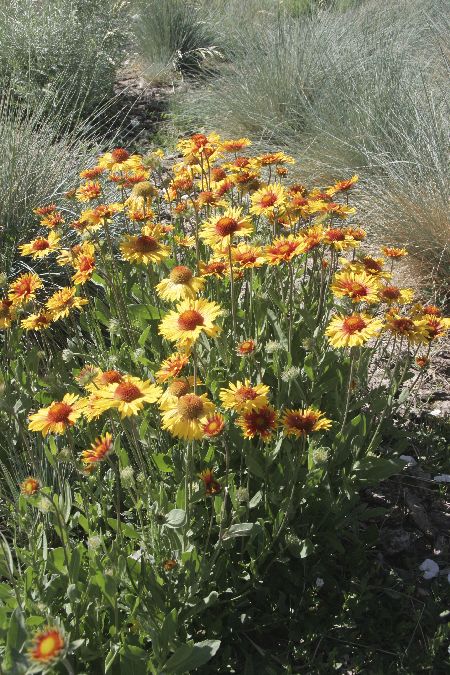
Gaillardia aristata
Native Blanket Flower
The pinwheel-shaped flowers of Native Blanket Flower are yellow and maroon. They are easy to grow from seed sown in spring or fall and are excellent in wildflower mixes. Canopy coverage: 3 square feet.
[Read More]Gaillardia x grandiflora
Blanket Flower
This is a hybrid between Gallardia aristata and Gallardia pulchella. Mature size of plants range from 2 to 4 feet high, depending on the selection. In hot summer regions locate plants where they will receive afternoon shade. Many cultivated varieties are available. 'Arizona Sun' is a dwarf selection reaching less than 1 foot high. Canopy coverage: 3 square feet.
[Read More]Gaura lindheimeri
Gaura
Gaura grows in an open form with long, slender, arching branches. Plants die down in winter with cold temperatures, then regrow in spring. Canopy coverage: 13 square feet.
[Read More]Gazania linearis 'Colorado Gold'
Colorado Gold Gazania
This is a cold-hardy Gazania with a long bloom season, lasting from summer into fall. Reaches just a few inches high, it self-sows to spread. Large, yellow, daisylike flowers grow 2 to 3 inches across. Canopy coverage: 1 square foot.
[Read More]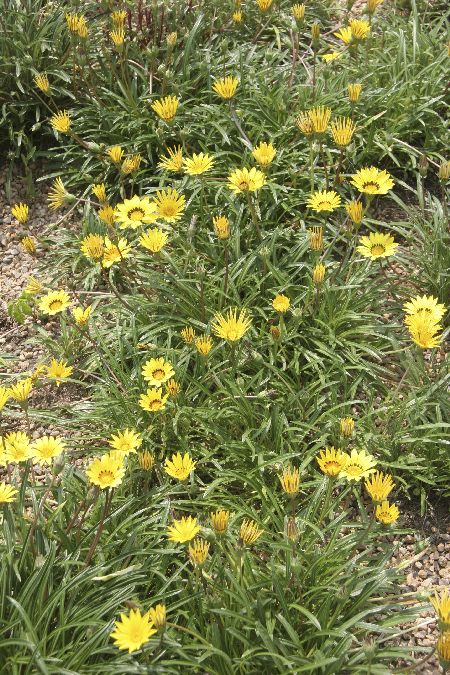
Gazania linearis
Treasure Flower, Gazania
Long bloom period where adapted with large flowers that hug the ground. Not always long-lived. Avoid overwatering. 'Colorado Gold' is an improved selection that is more tolerant to cold. Canopy coverage: 3 square feet.
[Read More]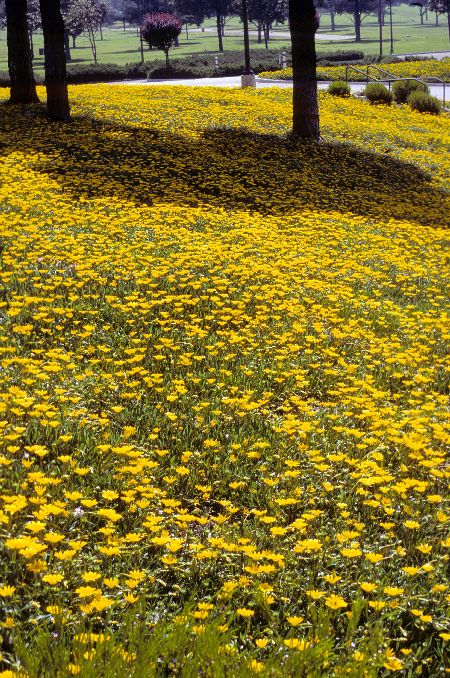
Gazania rigens leucolaena
Trailing Gazania
The flower colors of Trailing Gazania are gold, yellow and orange. Many selections are available. Not always long-lived. Avoid overwatering. Gazania linearis 'Colorado Gold' is a related species that is more tolerant to cold. Canopy coverage: 3 square feet.
[Read More]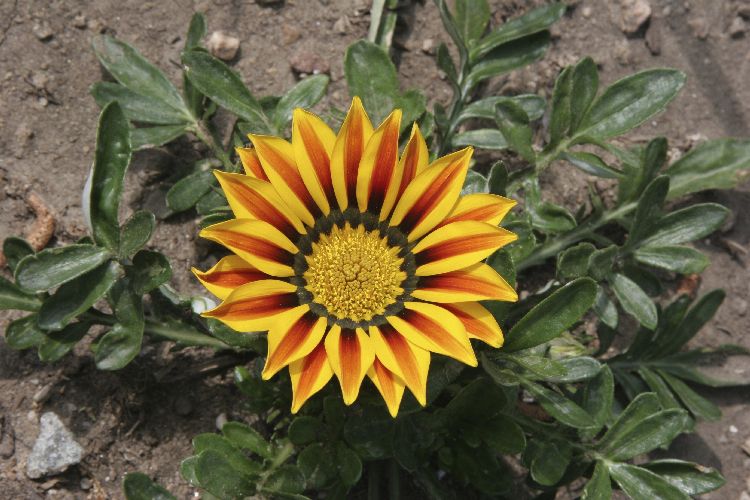
Gazania splendens
Gazania
This is a clumping form of Gazania. Also consider the trailing form, which is more commonly grown as a groundcover. Many selections are available. Not always long-lived. Avoid overwatering. Canopy coverage: 1 square foot.
[Read More]Geranium sanguineum
Bloody Cranesbill
Bloody Cranesbill grows as a dense mound, with fragrant flowers borne on stems that rise above the leaves. Red fall color. Selections with different flower colors are available. Canopy coverage: 7 square feet.
[Read More]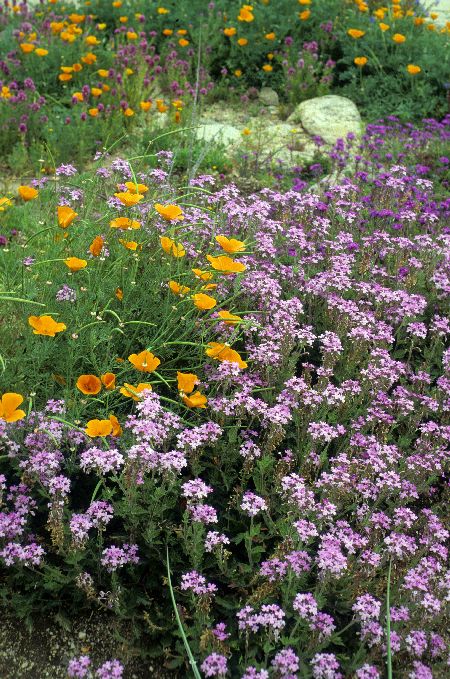
Glandularia gooddingii
Goodding Verbena
Goodding Verbena is typically short-lived but reseeds readily to continue future plantings. Excellent choice as a fast cover for bare ground. Canopy coverage: 3 square feet.
[Read More]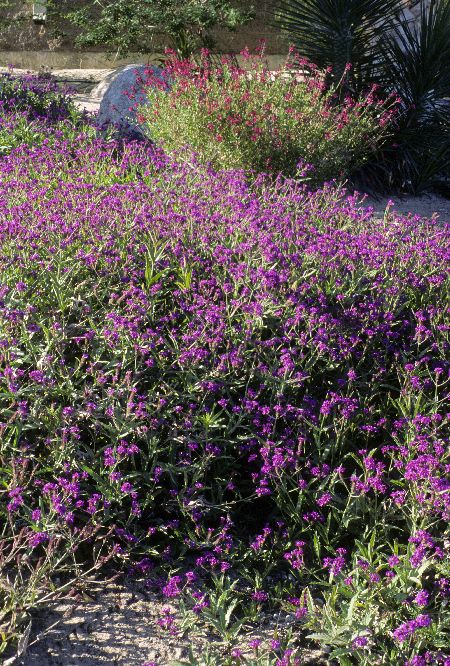
Glandularia rigida
Sandpaper Verbena
Consider this Verbena an easy-care groundcover, although it can be short-lived. Common name due to rough texture of leaves. Little care required; cut back dead or unsightly branches and past-prime flowers. Canopy coverage: 7 square feet.
[Read More]